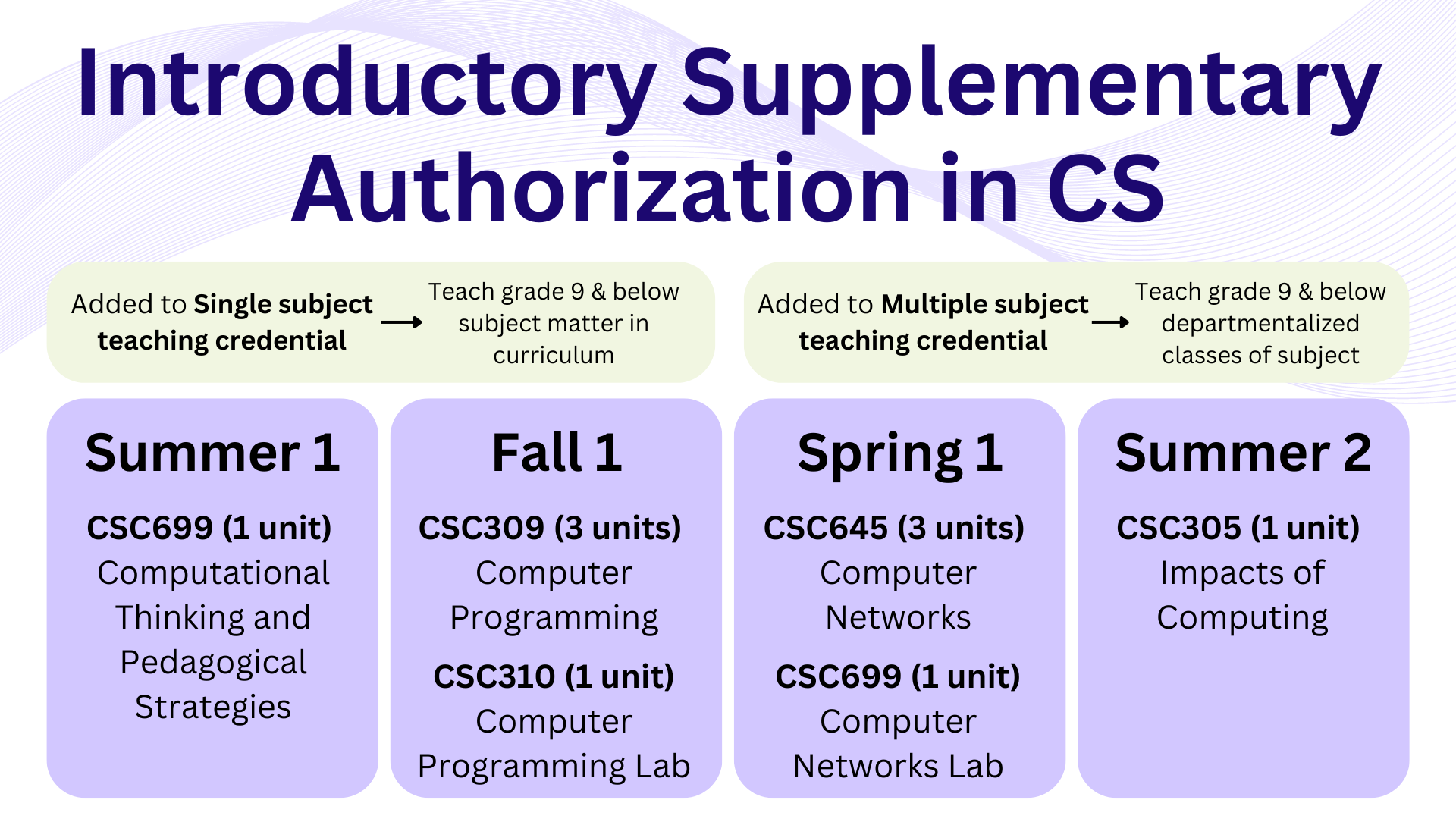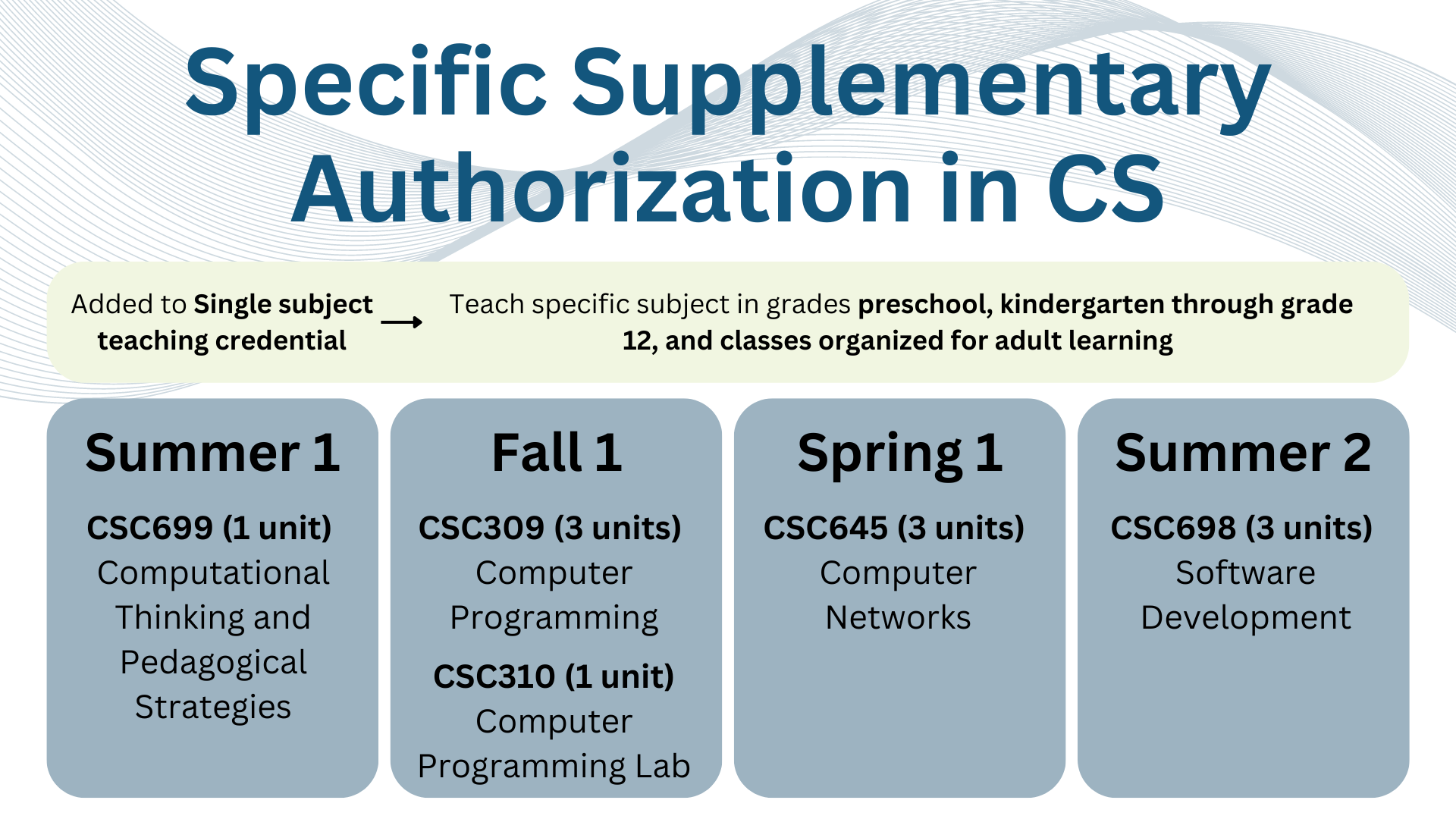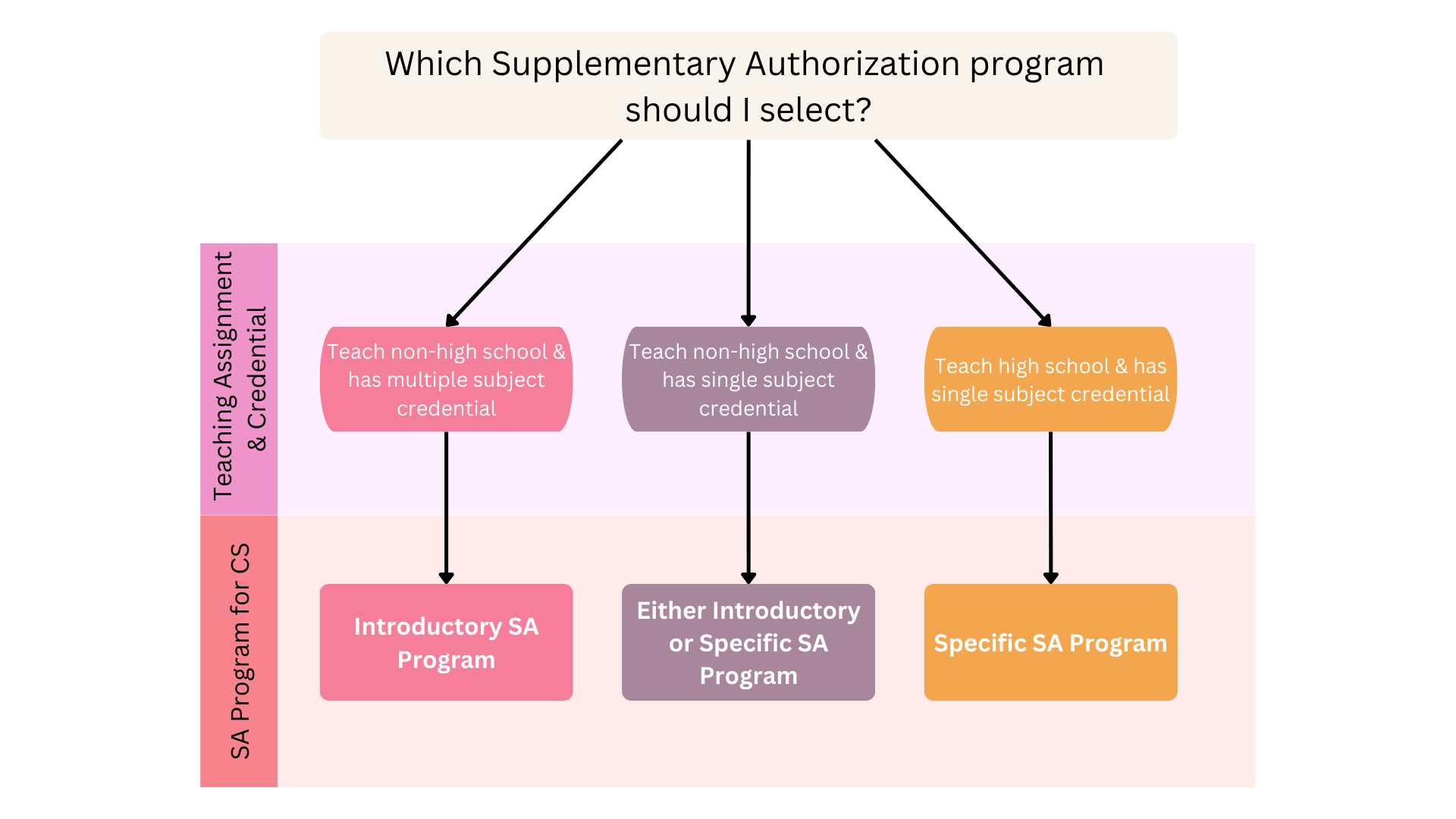What is Supplementary Authorization?
Supplementary authorizations allow the holder to add one or more subjects to his or her teaching credential, so the holder is authorized to teach a class in a subject outside the area in which he or she earned a credential.
To obtain a supplementary authorization in Computer Science (CS), an individual must complete a series of CS courses identified by California Commission on Teacher Credentialing at a regionally accredited institution.
Highlights of SFSU CS Supplementary Authorization Program
-
First Supplementary Authorization program in CS among 23 CSU campuses
-
100% online coursework
-
Instructors have 4+ year of experience in K-12 CS teacher professional development
-
Tuition waiver ($3,000/teacher for Introductory Supplementary and $3,900/teacher for Specific Supplementary)
-
94% retention and passing rate
Introductory Supplementary Authorization in CS

Specific Supplementary Authorization in CS

Course Details
CSC699 Computational Thinking (1 Unit)
This course introduces teachers to solving problems and designing systems by using fundamental computing concepts such as decomposition, data representation, generalization/abstraction, and algorithms. It also covers the definition of culturally responsive CS teaching and creates the framework for interweaving pedagogical content knowledge, domain knowledge of CS, and knowledge of families and communities.
CSC309 Computer Programming (4 Units)
This course introduces the fundamental concepts of algorithmic thinking as well as basics and practices of programming in Python. Topics covered in this course include Variables, Data Types, Control Statements, Loops, Lists, Dictionaries, Functions, Algorithms, and other topics.
CSC645 Computer Networks (4 Units for Intro; 3 Units for Specific)
This course introduces the components and functions of computing systems and digital devices, and it will cover fundamental principles and methods related to the design and implementation of computer networks and systems.
CSC305 Impacts of Computing (1 Unit; Intro only)
This course focuses on the social, ethical, and legal issues and impacts of computing, as well as the contributions of computer science to current and future innovations in the arts, business, humanities, medicine, and science
CSC698 Software Development (3 Units; Specific Only)
This is a capstone class in which teachers will demonstrate their knowledge of computational thinking, computing practice and programming, and computer and communication devices by completing a group project.Software design that includes the planning, engineering, and implementation of a software system will also be covered.
Common Q&As

Q: I'm not sure which SA course I should take. Which one should I do?
A: It is based on your current credentials and what academic level you teach. Please see the chart above for clarification on which SA course you should take, introductory or specific.
Q: I have a single-subject credential in mathematics, business, industrial and technology education, or Career Technical Education (CTE) credential in information technology. Do I need to take this Supplementary Authorization course to teach CS?
A: No! Single-subject credential in mathematics, business, industrial and technology education or CTE credential in information technology already allows for teaching CS. However, it is up to you and the discretion of your HR whether the Supplementary Authorization in CS is needed for your district/school!
Q: What Supplementary Authorization course should I take based on my credentialing: introductory or specific?
A: Those who teach grades 9 and below should select introductory SA. Those who teach grades 10-12 should select specific SA. Those who teach grades 10-12 but teach grades 9 or below content can take the introductory SA courses.
Q: I have a Special Education Credentials or Career Technical Education Teaching Credentials. Can I add a CS credential onto this?
A: Unfortunately, no. CS Supplementary Authorization cannot be added onto the SE or CTE credentialing (even though we wish it could!). The Commission on Teacher Credentialing (CTC) requires that the CS credentialing be applicable for only single-subject or multiple-subject credentialing.
Q: What are the qualifications for the SA program to obtain the credentialing?
A: Complete twenty semester units or ten upper division semester units, or the equivalent quarter units with a grade of "C" or better.
Q: What CS skills, languages, or coding background is needed or preferred to join the program?
A: NO prerequisites of knowledge or coding background.
Q: Are the classes online?
A: Yes. All classes are online via Zoom. You can contact instructors to schedule a meeting on-campus if needed.
Q: How much does this program cost?
A: There is no monetary cost. We cover the tuition fee, textbook, and supplementary authorization application fee from our grants.
Q: How large are the classes?
A: Cohort-based. There are 20-30+ teachers in this cohort.
Q: Approximately how many hours are required per week?
A: 3-hour synchronous session + 3-4 hour after-class work per week in Fall and Spring (total = 6-7 hours/week). 3-hour synchronous session + 2 hour after-class work daily in summer.
Q: Do I need to take all of the classes as I have some that might work for this credential?
A: You can use previous coursework as long as they meet CTC’s requirements.
Q: Can I add the certificate after I earn my single subject?
A: Yes.
Q: Will we need to take any exams (i.e. CSET) to earn the supplementary credential?
A: No
Q: Will I be able to teach the subject after the program?
A: You are authorized to teach CS after receiving the supplementary authorization.
Q: When will the first course start?
A: The first course of the SA program (Cohort 7) will begin in the summer for one week, 7/29-8/2.